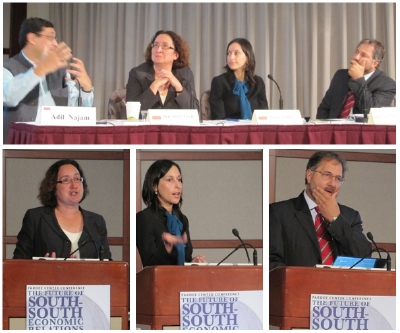“The Future of South-South Economic Relations” – Session 1
VIDEO: “The Future of South-South Economic Relations” Session 1
September 24, 2010
The Boston University Frederick S. Pardee Center for the Study of the Longer-Range Future held an all-day conference on ‘The Future of South-South Economic Relations‘ as part of its Africa 2060 program of research. The conference was held on Friday, September 25, 2010 at the Hariri Building (BU School of Management) and brought together experts from a variety of fields and from across the world and an audience of some 45 to discuss different aspects of the changing landscape and the emerging dynamics of economic – and especially trade – relations amongst developing countries. The conference was preceded by a welcome reception for conference presenters on Thursday, September 24.

The conference began with welcome comments from the two conveners of the conference – Pardee Center Director, Prof. Adil Najam, and Pardee Center Research Fellow Rachel Thrasher. The conference was part of a larger book project of the Pardee Center and papers presented in this experts conference will be collected into an edited book on the subject, expected to be published in 2011.
The first panel was chaired by Prof. Adil Najam (Boston University). Kathryn Hochstetler from the University of Waterloo presented her paper on the emerging and likely impacts of increased South-South trade on the environment; the paper from Mariana Rangel Padilla from the Tecnológico de Monterrey in Mexico focused on foreign direct investment (FDI) from developing countries and the patterns in which they are distributed around the world, including to other developing countries; and Alcides Costa Vaz from the University of Brasilia presented on the role of key emerging economies, including on the political aspects and explanations for the emerging trends. All three papers focused particularly on Brazil, although also on other development countries more generally.
